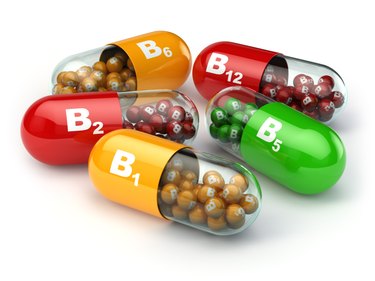
The group of B vitamins includes eight vitamins that work together to help your body digest food, strengthen your eyes, hair and skin and improve liver and nervous system function. B vitamins also help your body produce sex and stress hormones. If you take B vitamins in supplement form, they can effect your energy levels, and possibly make you feel overexcited or hyperactive. They also pose potentially serious side effects, so talk to your doctor about the risks and benefits of using them.
Vitamin B Supplements
Video of the Day
If you take B vitamin supplements, you may get excessive amounts of some B vitamins. The amount and type of B vitamins in B-complex formulas varies widely -- from 6,000 percent or more of the recommended daily allowance of some vitamins to little or none of others. Six of the B vitamins may boost your energy levels or treat problems such as anemia and depression that could make you fatigued. The B vitamins help your body produce hormones that involve stress and physiological arousal. If you obtain adequate B vitamins from your diet, taking B complex may effect your energy levels and, possibly, make you feel hyper. If you take vitamin B complex and feel hyper, check the product label for the amount of these B vitamins: B-1, thiamine; B-2, riboflavin; B-3, niacin; B-5, pantothenic acid; B-9, folate, and B-12, cobalamin. A side effect of taking excess vitamin B-3 includes irregular heartbeats, according to Medline Plus, a service of the United States National Institutes of Health.
Video of the Day
Vitamin B Deficiency
Unless you take vitamin B supplements to treat a deficiency or specific medical condition, you can simply stop taking them if their use made you hyperactive. Definitely stop taking them and contact your doctor if your symptoms include accelerated heart rate or high blood pressure. Pregnant women and women who take birth control pills may need to take extra vitamin B6. Adults older than 50, stomach surgery patients and persons with celiac disease or Crohn's disease may need to take vitamin B12 supplements. If you drink alcohol to excess, you may become deficient in several B vitamins. Your doctor can order a blood test to spot deficiencies.
Benefits
Science also supports several medical uses for B vitamins, but your doctor should prescribe and monitor your dose. Niacin improves cholesterol levels, while niacinamide – another form of vitamin B3 – may help delay the progression of Type 1 diabetes and relieve joint pain associated with osteoarthritis. Vitamin B2 – riboflavin – can help prevent migraine headaches but does not decrease the duration or intensity of attacks. Some people take B vitamins to increase their energy levels or relieve stress. But there's no evidence to suggest which combination or amount of B vitamins might provide an energy boost without causing hyperactivity .
Risks
If you take B vitamin supplements, it's safer to take ones that stick close to the recommended daily allowances. Side effects of taking more than the RDA of vitamin B include diarrhea, vomiting, headaches, sleepiness, insomnia, changes in the color of your urine and rashes. If you take megadoses of B vitamins, potentially serious side effects include rapid and irregular heartbeats, changes in your blood pressure and blood sugar levels, vision loss, gout, stomach ulcers and damage to your liver, nervous system and brain.
- University of Maryland Medical Center: Vitamin B3 (Niacin)
- Medline Plus: Thiamine (Vitamin B1)
- Medline Plus: Riboflavin (Vitamin B2)
- Medline Plus: Pantothenic Acid (Vitamin B5)
- Office of Dietary Supplements, National Institutes of Health: Vitamin B6
- Medline Plus: Pyridoxine (Vitamin B6)
- Centers for Disease Control and Prevention: Learn More About Vitamin B12 Deficiency
- Office of Dietary Supplements, National Institutes of Health: Vitamin B12
- Medline Plus: Niacin and Niacinamide (Vitamin B3)
- Office of Dietary Supplements: Dietary Supplement Fact Sheet -- Folate